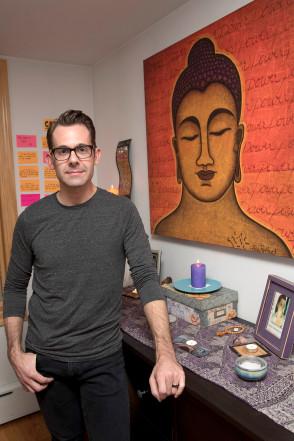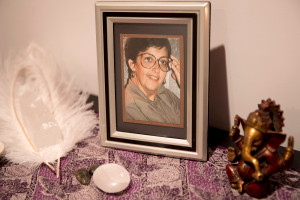By Molly Shea

[W]hen Chad Lewis’ mother passed away seven years ago from complications from diabetes, he couldn’t stop thinking about her death. “It wasn’t loving and sweet,” he says. “It was chaotic and angry and scary.”
So Lewis, a 39-year-old who lives in Astoria, set out to find a better way to process the end of life, ultimately making a career shift from Broadway stage manager to death doula.
Doulas who aid women in giving birth have been trendy for years, but now a different type of support person is helping people navigate life’s other major passage. Dying people and their loved ones are hiring death doulas to help them coordinate end-of-life care and vigils, plan funerals and provide a sympathetic but unattached ear.
The profession first came into being in the early aughts and is growing increasingly popular. In 2014, Suzanne O’Brien launched the New York City-based Doulagivers, an online training program for death doulas.
“I can hardly keep up with demand,” says O’Brien, who also holds monthly seminars at an Upper West Side branch of the New York Public Library.
The process usually starts with a patient deciding how they want to die and outlining that with the doulas.
“It’s similar to a birthing plan … Where [do] you want to die? What kind of room you want to die in? What [do] you want to be looking at? What [do] you want it to smell like?” says Shelby Kirillin, 41, a Richmond, Va.-based death doula. She charges between $1,000 and $3,000 as a retainer fee, and asks for payment upfront to avoid chasing down money posthumously. She’ll also work pro bono if a situation merits it.

“I had one young girl say she wanted to die in a yurt,” says Kirillin of a client who’s currently planning her own death. The girl’s cancer condition makes a yurt too impractical, so Kirillin is getting creative. “We decided on mosquito netting over her bed, and twinkle lights to look like stars.” After she takes her last breath, her loved ones will put wildflowers in her hair.
Death doulas also help out after someone passes. Lewis, who charges $20 to $25 per hour, likes to create a basic plan to take care of issues such as child care, grocery shopping and bill payment, to clear up mental space for grieving families.
And more than anything, the professionals help patients process what they’re going through.
“Families buffer pain — you hate to see people you love in pain. And doulas aren’t buffers,” says Kirillin. “Instead of saying, ‘OK, let’s see if we can give you meds,’ I’ll say, yeah, ‘I bet you are in pain. Tell me about it — what does it feel like?’”
When Richmond resident Mel Titus’ best friend of 31 years, Kim, was entering the final stages of her battle with cervical and breast cancers last year, they were introduced to Kirillin.
They were skeptical at first, but Kim (whose last name is being withheld for personal reasons) decided on a death doula so she could manage her death the way she did her life. “She was a processor,” says Titus. “She really liked that she could come up with a plan and do things a certain way.”
And for Titus, Kirillin provided emotional support during an impossible time. “I would have tough days, and I’d call Shelby, and she’d walk me through it,” she says.
Kirillin helped the duo plan Kim’s visitor schedule, and what music they’d play and books they’d read in the final days. Taking care of logistics freed them up to reminisce about Kim’s life, and even laugh about how things were going. “We actually had some funny moments, believe it or not,” says Titus. “It’s sad, but it can be a happy thing, too.”
Complete Article ↪HERE↩!
